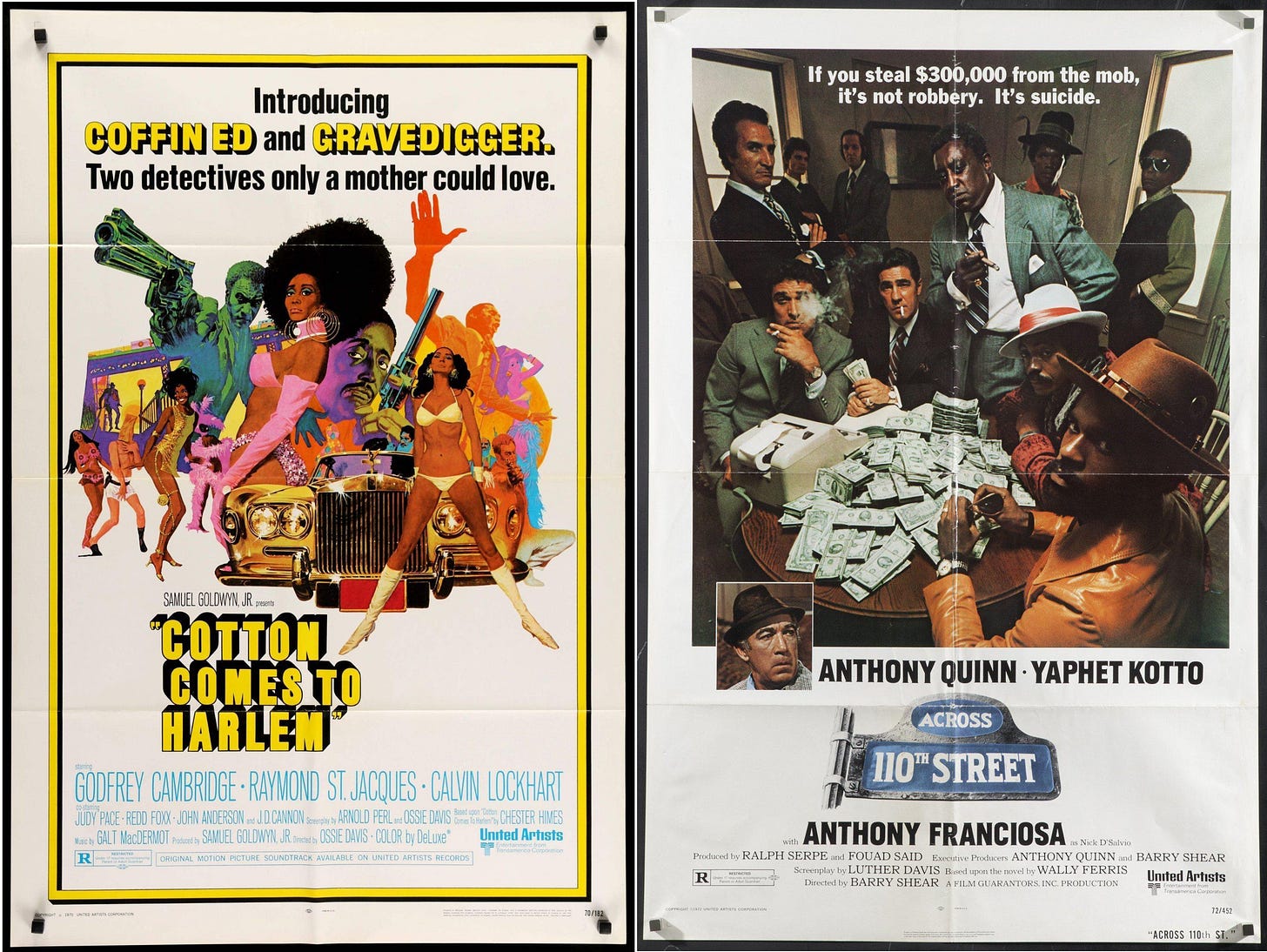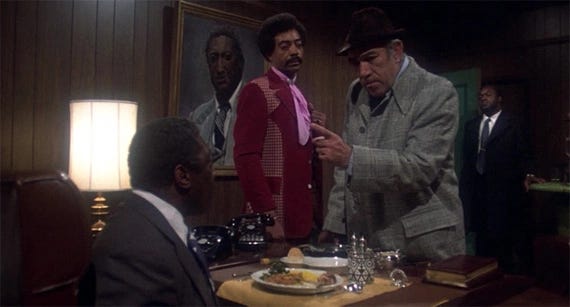This month, the Criterion Channel launched a collection of neo-noir films, and so OF COURSE, Josh and I are working our way through the entire thing—from 1970 to 2005—in order.
And yes, we’re re-watching the ones we’ve already seen.
So we’re currently neck-deep in lonely private investigators, crooked cops, complicated-at-best family dynamics, beautiful ladies who always know more than they let on, sad dudes walking dejectedly away from the camera (if they’re lucky), and, of course, eighty bajillion cartons of cigarettes.
Obviously, we’re in heaven.
Cotton Comes to Harlem
Ossie Davis, 1970
Based on a book by Chester Himes—did this prompt a serious rabbitholing session about Chester Himes? Yes, yes it did—and directed by Ossie Davis, this one stars Godfrey Cambridge and Raymond St. Jacques as Gravedigger Jones and Coffin Ed Johnson, two Harlem cops who are trying to track down $87,000 that a conman-preacher bilked out of locals, but then was then stolen from the conman. (Or is the conman in on the robbery?? Gravedigger and Coffin Ed think that’s pretty dang likely.) Redd Foxx and Helen Martin also appear in smaller roles.
The costuming is FANTASTIC. When the conman-preacher first shows up, he’s wearing what appears to be a sparkly choir robe… which then turns out to be a CAPE with scarlet lining, and under it, he’s wearing a white suit with a pink tie & pocket square, and it just goes from there. I also might watch it again just for the ladies’ hats.
Godfrey Cambridge, who plays Gravedigger, is AMAZING. He’s one of those actors who can express serious side-eye without actually physically side-eyeing the person that he’s side-eyeing, and I fell in such immediate love with him that I jumped over to Wikipedia… and discovered that he died at age 43, so he’s actually not in a ton of movies. Which is a wicked bummer on all fronts.
It’s a super simple premise—buddy cops tracking down stolen money—but the various motivations and perspectives are more complex than you’d expect, and I’m guessing that that might be because, in part, of the source material? Josh and I are clearly on a similar wavelength there, as I just mentioned to him that I’d requested the first book in the series from the library… and he responded that he’d just ordered a copy from eBay. So, we’re both looking forward to THAT!!
This one was filmed on location in Harlem in 1969, and the extras were mostly local residents. There are long sequences that show storefronts and nighttime driving, and I love these neo-noir movies for that—seeing different parts of cities in different eras; they feel like a time capsule.
Across 110th Street
Barry Shear, 1972
Oh, man, this one is so much heavier.
It’s GREAT, but it’s brutal, and there are no happy endings. (Which is generally the way things go in neo-noir stories. But in the especially good ones, I always end up feeling that gutpunch, even if I think I’m emotionally prepared.)
Anthony Quinn and Yaphet Kotto play two cops—one older and white, one younger and Black—working to track down a group of thieves who stole $300,000 from the Italian mob (and killed a whole bunch of people in the process). The thing is, it’s not just the police who are trying to find the thieves—the Italian mob AND the Harlem mob are both looking for them as well.
As we neared the end of the film, with (spoiler) only thief left alive, and headed for the rooftops with a gazillion people in pursuit, I turned to Josh and said, “There is a 900% chance that this is about to be real bad.”
And I was not wrong.
I cannot overemphasize this: This movie is brutal.
Except for the Italian mobsters, everyone else—the thieves, the cops, the Harlem mob—were sympathetic at different points. They were all flawed, they all had moments where they did things that were Not Good, but they were all portrayed as three-dimensional human beings. This movie is packed with outstanding performances across the board, with nuance and care taken with the characterization and motivations and relationships and power dynamics and political structure and... everything.
Anthony Quinn executive produced, and apparently tried to get John Wayne, Burt Lancaster, and Kirk Douglas to play the role that he ended up playing. Also according to IMDb trivia, he wanted Sidney Poitier, Harry Belafonte, and Sammy Davis Jr. to play the roles that ended up going to Yaphet Kotto, Paul Benjamin, and Antonio Fargas, but residents of Harlem—where the movie was filmed, almost entirely on location in 1972—voiced objections to that casting because Quinn’s choices were “too Hollywood.”
It’s also based on a book, but I’m not especially planning on tracking it down. When a trusted friend saw that I’d just watched this, he said, “Every time I watch it it gets better. Love this one-never ever read the racist ass book it is based on.” So I’ll save my time for Chester Himes and MORE neo-noir movies, thank you very much.
Anyway, long story short: It’s not a hopeful movie, but it sure feels like an honest one.
I’m sure that you can watch these on various other streaming services, but here’s the teaser trailer for the Criterion Channel collection:
Next up: Two rewatches! The Long Goodbye & Chinatown.
What are YOU watching this weekend?







